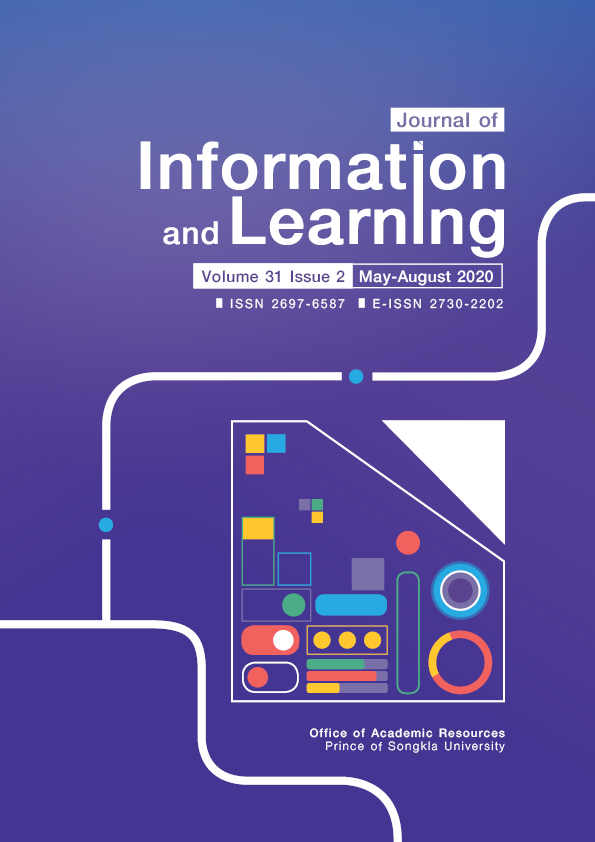Learners’ Satisfaction towards Online Chinese Phonetics Lessons on JFK Online Courses
Main Article Content
Abstract
The purpose of this research was to examine learners’ satisfaction towards three sets of Chinese phonetics lessons (Pinyin) i.e., single vowels and consonants, diphthongs and special vowels, and nasal vowels, on JFK online course system. The sample was comprised of 93 undergraduate students from Prince of Songkla University, Pattani Campus enrolled in the second semester of academic year 2017, and other learners. A questionnaire was used for data collection. Statistics used in the research were percentage, mean, and standard deviation.
Research findings revealed that the learners were satisfied with the three sets of the Chinese phonetics lessons (Pinyin) in maximum level. The lesson set that has the highest average satisfaction is single vowels and consonants, followed by diphthongs and special vowels, and nasal vowels, respectively. They were most satisfied with the five main elements of the lesson format including learning outcomes, content structure design, learning activities design, teaching and learning materials, and applications.
Article Details

This work is licensed under a Creative Commons Attribution-NonCommercial-NoDerivatives 4.0 International License.
The Journal of Information and Learning is operated by the Office of Academic Resources, Prince of Songkla University. All articles published in the journal are protected by Thailand copyright law. This copyright covers the exclusive rights to share, reproduce and distribute the article, including in electronic forms, reprints, translations, photographic reproductions, or similar. Authors own copyrights in the works they have created as well as the Office of Academic Resources. The Journal reserves the right to edit the language of papers accepted for publication for clarity and correctness, as well as to make formal changes to ensure compliance with the journal's guidelines. All authors must take public responsibility for the content of their paper.
References
Chacon-Beltran, R. (2017). The role of MOOCs in the learning of languages: Lessons from a beginners’ English course. Porta Linguarum, 28, 23-35.
Google Open Online Education. (2019). Course Builder 1.10. Retrieved from https://edu.google.com/openonline/course-builder/docs/1.10/index.html
Manning, C., Morrison, B. R., & McIlroy, T. (2014). MOOCs in language education and professional teacher development: Possibilities and potential. Studies in Self-Access Learning Journal, 5(3), 294-308.
Motzo, A., & Proudfoot, A. (2017). MOOCs for language learning–opportunities and challenges: the case of the Open University Italian Beginners’ MOOCs. In Q. Kan & S. Bax (Eds), Beyond the language classroom: researching MOOCs and other innovations (pp. 85-97). Research-publishing.net. Retrieved from https://doi.org/10.14705/rpnet.2017.mooc2016.673
Phanphinit, S. (2011). Research techniques in social science (2nd ed.). Bangkok: Witthayaphat.
Phrarātchabanyat kānsưksā hǣng chāt 2542 [National education act 1999]. (1999). Retrieved from https://person.mwit.ac.th/01-Statutes/NationalEducation.pdf
Prakāsok ra sūang sưksāthikān rư̄ang lakkēn kān khō̜ poēt læ damnoēnkān laksūt radap parinyā nai rabop kānsưksā thāng klai [Announcement of the Ministry of Education on criteria for opening and executing degree courses in the distance education system]. (2005). Retrieved from http://www.education.mju.ac.th/fileDownload/50.pdf
Silanoy, L., Tungkasamit, A., & Silanoy, O. (2007). The effect of e-learning use on 5 year program sutudents in teacher and esarn society course. KKU Research Journal, 12(1), 90-98.
Theeraroungchaisri, A. (2007). MOOC kap ʻanākhot kānsưksā Thai nai yuk dičhithan [MOOC with the future of Thai education in the digital age]. Retrieved from https://www.nectec.or.th/ace2016/pdf/session7_01Anuchai.pdf
Wipawin, N., & Wittayawuttikul, R. (2014). Massive open online course (MOOC) with the challenges of the university library. TLA Research Journal, 7(1) 78-89.
Yuan, L. & Powell, S. (2013). MOOCs and open education: Implications for higher education (A white paper). JISC Centre for Educational Technology & Interoperability Standards (CETIS). Retrieved from https://publications.cetis.org.uk/wp-content/uploads/2013/03/MOOCs-and-Open-Education.pdf


